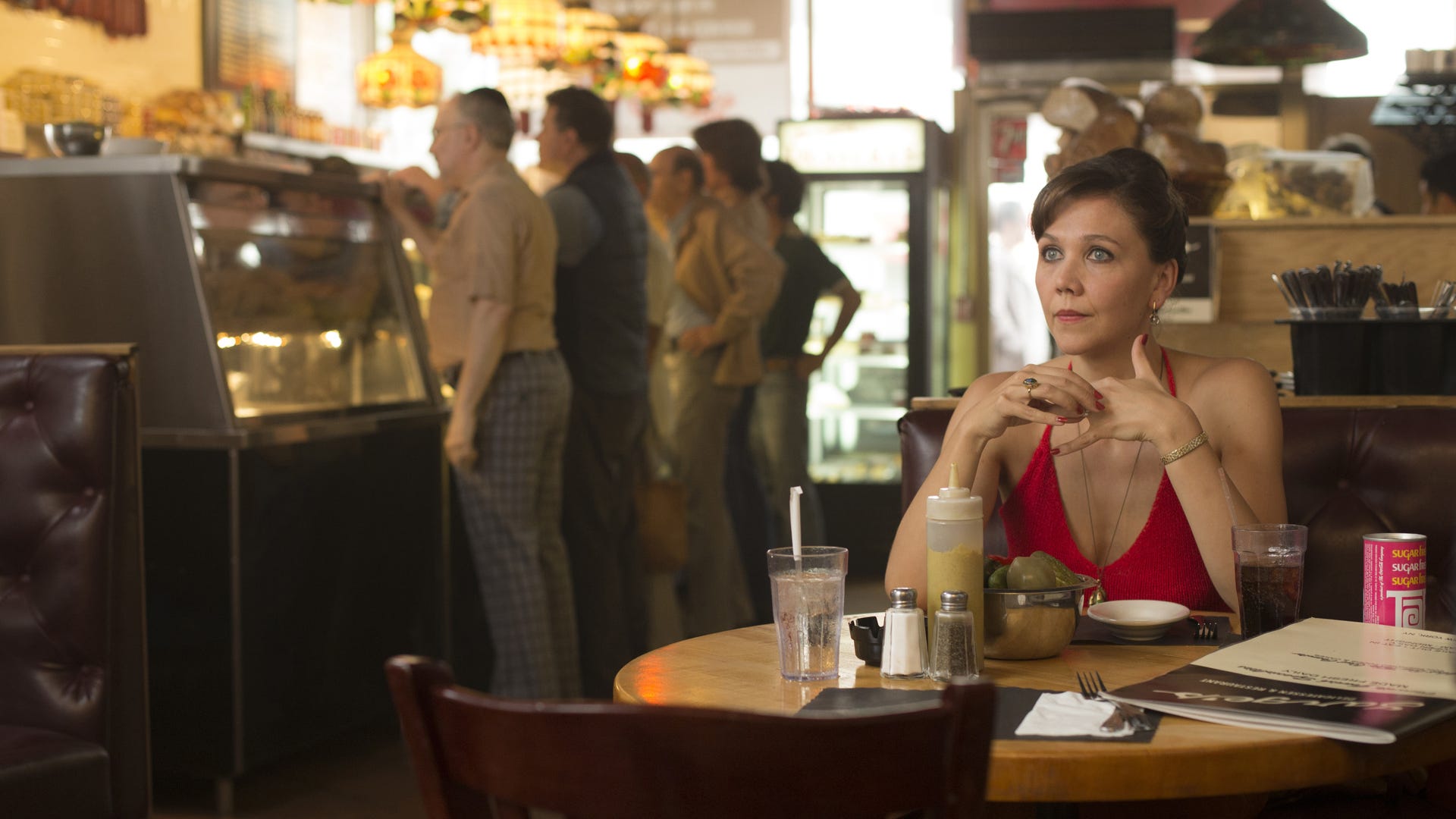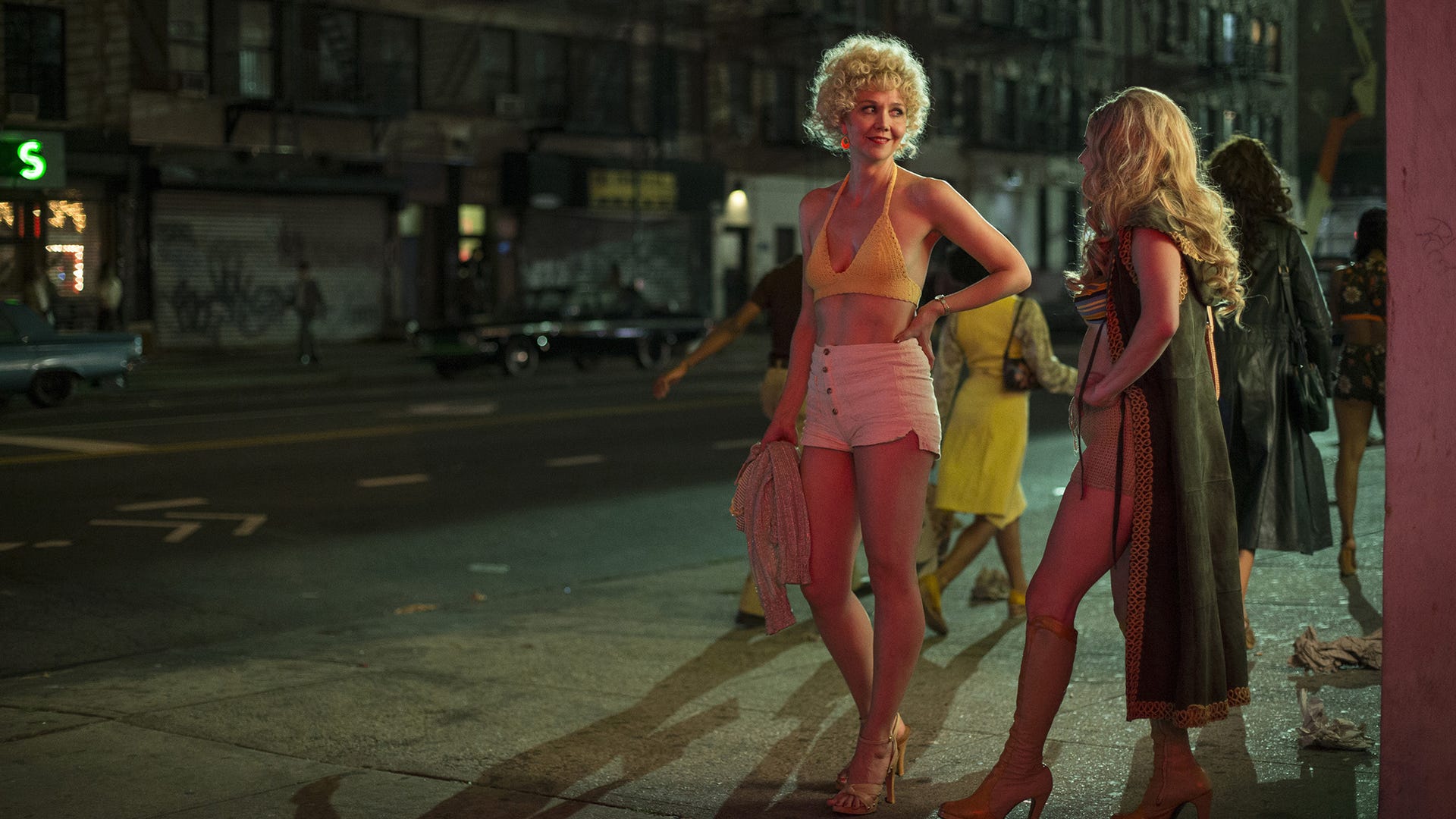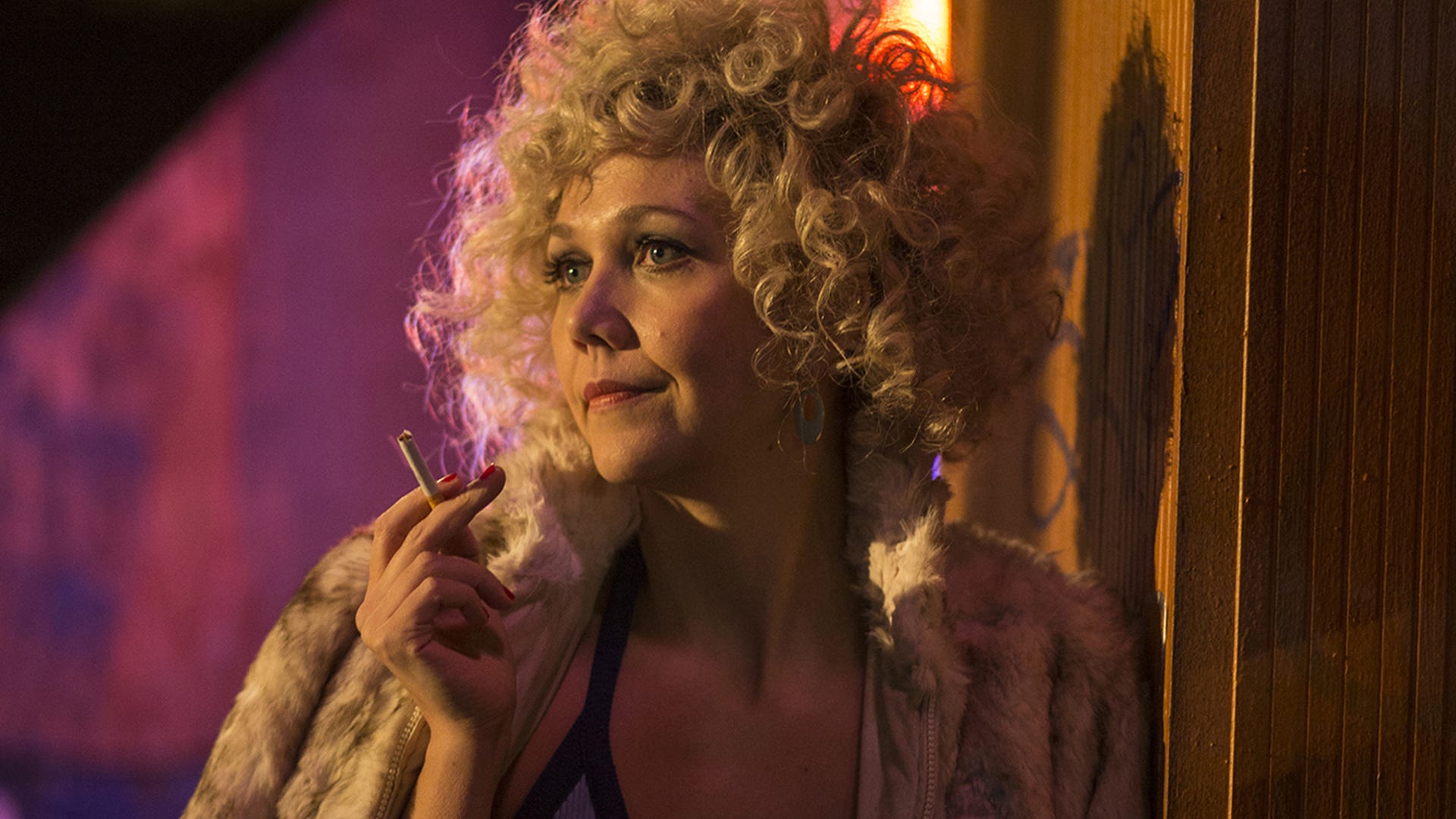Join or Sign In
Sign in to customize your TV listings
By joining TV Guide, you agree to our Terms of Use and acknowledge the data practices in our Privacy Policy.
Maggie Gyllenhaal Won't Win a Golden Globe for The Deuce But Damn, She Should
One of the best performances of the year will go unawaraded but not by us
Barring some kind of La La Land/Moonlight level shock, Maggie Gyllenhaal won't win the Golden Globe for Best Performance by an Actress in a TV Series for HBO's The Deuce. Voters, like the public, will be choosing between trophy juggler Elisabeth Moss for her mesmerizing The Handmaid's Taleperformance or Claire Foy's majestic moment in The Crown, which won best performance and series in 2017. It's a shame Gyllenhaal is up against Moss and Foy though, because she'll be overlooked for a singular and rather unapologetic portrayal of a feminist who is unlike any of the other characters in the category.

Maggie Gyllenhaal, The Deuce
FXLiterally laying her entire self bare, Gyllenhaal takes the kind of risks in The Deuce one might expect of indie film ingenue, as opposed to the Oscar-nominated A-lister Gyllenhaal is. Playing Eileen "Candy" Merrell, a prostitute walking 42nd Street ("the Deuce") in 1971 New York, Gyllenhaal turns in scenes that are shocking and, in the eyes of some, even dehumanizing.
In one clip, Candy starts performing fellatio on a client she found while cruising in a seedy Manhattan theater when a rat climbs on her back, which causes her to jump up and accidentally smash the guys' face. In another, she's blowing a Weinstein-ish ogre of a john in a disgusting hotel room when he dies mid-service, leaving her comes to grips with the little death, as the French call an orgasm, and the big one while holding his limp manhood in her hands. On paper, these kind of romps could've been just cheap provocations used to titillate men and prepubescent boys. Candy's exploits could've come at the expense of her personhood. It could be degradation masquerading as something thoughtful. But it's not. Gyllenhaal gives Candy humanity, intellect and dignity. She remains in control, even when she's on her knees.

Maggie Gyllenhaal, The Deuce
Paul Schiraldi/HBOAll this was by Gynllenhaal's design, per her insistence that she be a producer on David Simons (The Wire) project. This sounds easier and less audacious than it apparently was. In interviews, Gyllenhaal said that simply asking to be a producer on the series seemed a radical idea. "Basically all my agents, my manager and even my friends were like, "You're never going to get that,'" she told The Hollywood Reporter. "It's a project that you didn't develop and you don't have any producing credits under your belt. There's no way. I don't even know why you're asking for this." (This is a woman, it should be noted, whose average box office gross for movies she stars in surpasses $37.5 million.)
A producing credit, she reasoned, would allow her more agency in the conversation about sex work and misogyny that The Deuce creates organically. "I thought it would be a guarantee that my mind would be included in the storytelling process, not just my body," she said. Yet that credit made her an incredibly important anomaly. Women were just 28% percent of all creators, directors, writers, executive producers, producers, editors and directors of photography in the 2016-17 season -- a mere two percentage point increase from the previous one.
Here's Everything to Know About the 2018 Golden Globes

Maggie Gyllenhaal, The Deuce
HBOOne scene that makes that clear is when Candy has sex with a romantic interest -- a scene Gyllenhaal demanded stay in the series. In it, a man Candy hesitantly goes on a date with fails to bring her to climax, so she pleasures herself to orgasm. He becomes merely ornamental. Candy may not have had Betty Friedan's famous quote "No woman gets an orgasm from waxing the kitchen floor," from The Feminine Mystique in her head while she finished the job, but she nonetheless showed an acute appreciation for her own needs that, in context, qualifies as a political act. As The Deuce lore goes, Gyllenhaal had the scene written in, but it was cut for time. "I basically wrote a dissertation on why we had to keep the orgasm, and they put it back," she said, explaining that it provides a contrast between Candy's transactional sex and Candy's arousal for her own sake.
As strong-willed as Gyllenhaal makes Candy, the call girl will on Golden Globes night look like a disheveled runaway among polished prom queens. She's easy to look away from. The Deuce is dark, not just in patina, but also because it sympathizes with, in the show's own words, sleazeballs: pimps, whores, drunks, thugs and other lowlifes who congregate in Vincent Martino's (James Franco) Hi-Hat bar. The Deuce makes no excuses for its characters, and unlike more overtly feminist fare such as The Handmaid's Tale, Candy isn't forced into her life, she chooses it. It's unlikely that the Hollywood Foreign Press would choose a tale of a tough-as-nails sex worker in hot pants over Handmaid's captives, being bred as if they were mules.
12 Essential TV Episodes to Watch Before the Golden Globes
But Candy is no less feminist than the characters she's up against. Her job title does not diminish the fact that she has to fight to be treated as a full person. Certainly, she's as much an authority on the commodification of women's bodies as Handmaid's Offred -- as much as an illustration of the structural disadvantages women must leap over and through just to survive as Hannah (Katherine Langford) in 13 Reasons Why. Candy undoes the preference for tidy, upstanding heroines who battle the patriarchy in morally approved ways. Freed of the shame and self-loathing society insists she carry as a woman who sells sex, Candy torches the notion that heroines should be "good girls" revolting. She has mastered the art of survival in a man's world -- using what she's got to get what she wants -- a triumph on its own.
Gyllenhaal's willingness to share her skin and breasts and get on her knees certainly took courage. But by insisting on a level of control and nuance that would've otherwise not existed, she imparted a much-needed observation about the intersection of capitalism, women's bodies and the industries that churn off them. She won't win a Golden Globe for it, but like her character, she blazed a trail for other women behind her by disrupting the status quo.
The Golden Globe Awards air Sunday at 8 p.m. ET / 5 p.m. PT on NBC.
